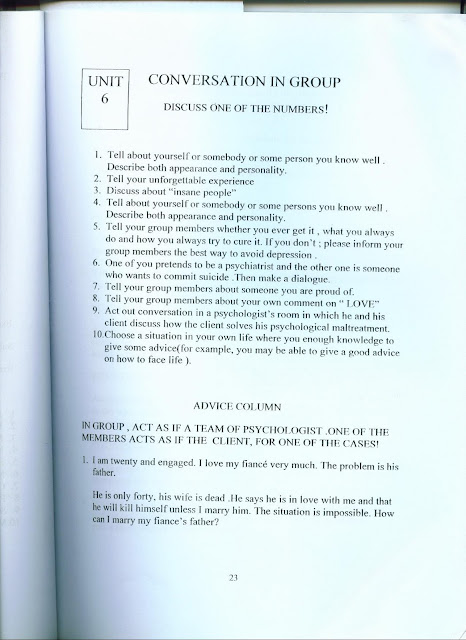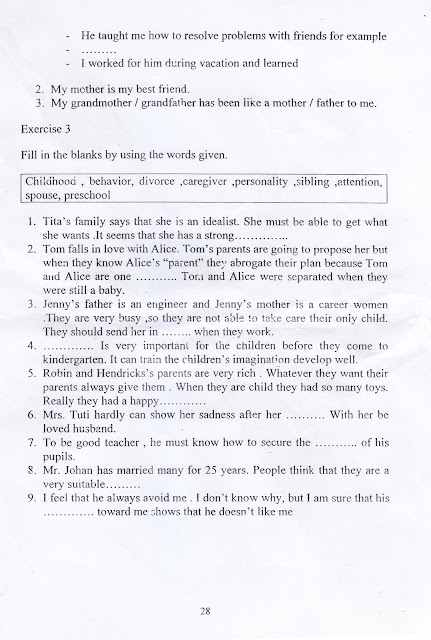UNIT 1 PSYCHOLOGY AT A GLANCE
Psychology studies the activities of individual. The science of human behaviors is actually a group of sciences. On one side we find psychology investigating the organs and cells that do the work of the organism, and the other side we see the social sciences studying nations and groups of mankind. There is room for a middle science that shall focus its attention on the individual. That middle science is psychology. Psychology studies the individual’s activity through-out his span of life, from the beginning before birth, up through the end of life. During this life history, the Man remains the same individual, although his behavior shows continuity along with many changes.
Psychology Compares children and adults, the normal and the abnormal and the human and the animal. It is interested in the differences between one individual and another, and still more interested, if possible, in the general laws activity including event of very different individuals-laws, for example, of growth, learning, thinking and emotion. Psychology can be defined as the science of the individual’s activities.
The word “activity” is used here in a board sense. It includes not only motor activities like walking and speaking but also cognitive (knowledge-getting) activities like seeing, hearing, remembering, thinking, and other emotional activities like laughing and crying, or feeling happy or sad. These last many seem passive, because they are activities, for the depend on the life of the organism, any manifestation of life can be called and activity. No matter how passive an individual may seem to himself in watching a game or listening to music, he is really carrying on an activity. The only way to be completely in active is to be dead.
VERB :
Studies : (stΛdi-ess) kkt. belajar. mempelajari
Find : (faind) vb mendapat : ̴̴ out, mendapati
Work : (w[^u]rk) kb. pekerjaan. karya. kerja. --kkt. mengerjakan. mengolah, mengusahakan
See : (s[=e]) melihat (s.o. or s. t.). menjumpai. membaca. membicarakan, pergi ke. menemui, berbicara dengan. memeriksa. mengerti. mengunjungi. bertemu, berjumpa.
Studying : (stΛdi-ing) kkt. belajar. mempelajari
Focus : (‘fouk ɚs) focus ; titik api
Studies : (stΛdi-ess) kkt. belajar. mempelajari
Trough-out : (tr[o^]f-ott) menempati
Remains : (Re*mein"es) kkt. tetap seperti seharusnya
Shows : (souus) kb. pameran, tontonan. pertunjukan. --kkt. (showed, showed or shown). memperlihatkan (to kepada)
Compares : (Com*peer-es) kkt. membandingkan. dibandingkan
Used : (yuus – ed) kb. penggunaan. kegunaan. gunanya. --kkt. menggunakan, mempergunakan, memakai
Activity : (Ac"tif-iti) rajin, cergas, aktif bekerja
May seem : (mee’ simm) kkb. (meight) boleh. mungkin. barangkali. semoga, mudah-mudahan
Listen+ing : (‘lisn) vb mendengarkan
Carry+ing : (‘kaeer) vb 1. Membawa ; 2. Memikum ; 3. Bersandar ; 4. Menjinjing
TRANSLATE
SEKILAS DALAM PSIKOLOGI
Psikologi mempelajari aktifitas individu. Ilmu yang mempelajari tentang perilaku manusia sebenarnya merupakan kelompok ilmu. Di satu sisi kita menemukan psikologi menyelidiki organ-organ dan sel-sel yang berkerja pada organisme, dan di sisi lain kita melihat ilmu pengetahuan sosial mempelajari bangsa dan sekelompok manusia/individu. Ada tempat bagi ilmu menengah yang akan memfokuskan perhatiannya pada individu. Ilmu menengah tersebut adalah psikologi. Psikologi mempelajari aktifitas individual melalui jangka waktu hidupnya. Dari awal sebelum lahir hingga menjelang akhir hidupnya. Sepanjang sejarah kehidupannya, manusia tetap individu yang sama walaupun perilakunya menunjukan kontinuitas bersama dengan banyak perubahan.
Psikologi membandingkan anak-anak dan orang dewasa, normal dan tak normal, manusia dan hewan. Hal ini sangat menarik dalam perbedaan individu yang satu dengan individu lainnya dan lebih menarik lagi jika memungkinkan dalam hukum aktifitas umum meliputi kejadian yang sangat berbeda dari hukum individual sebagai contoh ; perkembangan, belajar, berfikir, dan emosi. Psikologi dapat di definisikan sebagai ilmu aktifitas individu.
Kata “aktifitas” yang dipakai disini, dalam jangkauan luas. Hal ini meliputi tidak hanya aktifitas motorik seperti berjalan dam berbicara, tapi juga aktifitas kognitif (memperoleh pengetahuan) seperti melihat, mendengar, mengingat, berfikir dan aktifitas emosional lainnya seperti tertawa dan menangis atau merasa bahagia/sedih. Hal ini mungkin terlihat pasif, karna mereka adalah aktifitas, mereka bergantung pada kehidupan organism. Perwujudan kehidupan dapat dinamakan aktifitas. Tidak masalah seberapa pasif seseorang mungkin terlihat bagi dirinya dalam menonton permainan/mendengarkan music, dia sedang beraktifitas. Hanya 1 cara agar sepenuhnya menjadi tidak aktif yaitu kematian.
Glossary :
Behavior : tingkah laku
Attention : perhatian
Mankind : orang
Remains : tetap
Definded : diartikan, didefinisikan
Manifestation : perwujudan
Exercise 1
Answer these following questions
1. What is psychology?
Psychology is a science that studies human activities/behavior.
2. Name some individual activities?
Eating, writing, drinking, sleeping, talking, etc.
3. Give example(s) of motor, cognitive, and emotional activities?
Motoric = walking, running, writing. Cognitive = thinking, remembering, studying. Emotional = sad, angry, happy, etc.
4. Is listening to music a kind activity? Why? Why not?
Because listening is kind of cognitive activity.
5. What is meant by : the science of human behavior is actually a group of sciences?
The science of human behaviors is actually a group of sciences.
6. When do we call an individual completely inactive?
When someone died.
7. The word “activity” is used in a very broad of sense. What does it mean?
The word “activity” is used here in a board sense.
8. What kind of activity is happening when you write a letter to your girl or boy friend?
Emotional activity for exp happy, nervous, confused, etc.
9. Why do we study human behavior?
Because we are social creature. So we can’t live alone, because of that by study human behavior we can’t understanding each other.
10. What causes the differences between individuals?
Experiences and education at home genes, environment.
LANGUAGE WORK
A sentence is a group of words constructed orderly. It needs certain rules how to put the words into a sentence. First of all, we have to analyze the part of speech, that is, the classification of the word. Traditionally, a word in English is divided into part of speech, namely, noun, adjective, verb, and adverb. Look at these example.
1. Psychology compares children and adults
noun verb noun noun
2. The word “activity” is used here in a very broad sense
Noun noun verb verb adverb adverb adj noun
Behavior, attention, childhood, adolescence, maturity, motoractivity, cognitive activity, emotional activity, investigates
1. He loves his mother very much. When his mother was sick, he showed his
attention.
2. When he was child, he never played toys. He really had an un happy
childhood.
3. Their
behavior towards me shows that they do no like me. It can be proved from how the look at me. When we meet, they always look away for me.
4. When a boy or girl gets biological changes and psycologycal changes (puberty), he or she enters in the
maturity era.
5. When a baby learn how to take a walk and how to talk, he develops his
motoractivity.
6. It is common for a mother to make her baby smile by doing a funny thing. Often, she does not get smiling and crying, even laughing, is good for a baby because at such time he develops his
emotional activity.
7. There was a mysterious murder. The police get difficulties to handie this case and look for a murderer. Finally they ask some detectives to
investigates this case.
8. In Javanese culture when a baby is just delivered by a mother, the other people always try to wake the baby up by making aloud noise. The baby, of course, is surprised. But it is good for him because he develops his
cognitive activity.






